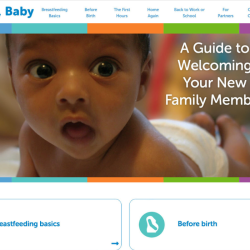A path forward: adapting Ready, Set, Baby during COVID
During the early part of the COVID-19 pandemic, there were lower breastfeeding rates and lactation education, especially for people for whom in-person education and counseling might be difficult. With modifications, the Carolina Global Breastfeeding Institute’s (CGBI’s) Ready, Set, Baby (RSB) was able to virtually provide live breastfeeding education during the pandemic via Zoom. Based on the data from the latest survey of participants, going forward after the pandemic, RSB Live could be a viable prenatal educational resource, especially for those who want to provide human milk to their babies.
A Journey Begins
Kathy Parry was there when the seeds for the RSB program were planted. Currently the Project Director, Parry is the perfect person to talk about the RSB journey from printed handouts to the webpage to the online live iteration developed during the COVID-19 pandemic and the program’s impact.

Kathy Parry
After completing CGBI’s Mary Rose Tully Training Initiative (MRT-TI) Pathway 2 lactation program, Parry joined the staff in 2012 to develop prenatal patient education materials to help hospitals with Step 3 of the Baby-Friendly Hospital Initiative. “We created it based on a draft that students had put together in the MRT-TI program. We also collaborated with the UNC Women’s Hospital lactation consultants,” said Parry. “Between the lactation consultants, MRT-TI students and CGBI staff, I was able to lead the effort to create an educational booklet.”
Over the next couple of years, RSB expanded their educational materials, including a flipchart and revised resources in 10 different languages (English, Spanish, Arabic, Burmese, Chinese, French, Nepalese, Russian, Ukrainian, and Uzbek), that could be shared with hospitals and birthing facilities. In addition, the Connecticut Department of Public Health reached out to the RSB team because they wanted to create a website based on the RSB information.
A Patient Resource
RSB is about the continuity of evidence-based care for the pregnant patient. The program ensures that parents are prepared for the kinds of maternity care practices that hospitals are beginning to implement to support lactation, like skin-to-skin contact right at the time of birth.
“Continuity of care is this idea that from provider to provider, the patient is never dropped,” said Parry. “What we see is there’s a lot of focus on helping hospitals with the care that they provide their patients. But what about before they show up and what about after they leave in terms of maternal and infant health? We’re also educating the patients to be expecting best practices when they deliver and providing tips to overcome challenges after they’re back home with their baby.”
A Consequence of COVID-19
After COVID-19 hit, many hospitals and prenatal clinics were only bringing patients in for necessary appointments and procedures. “People weren’t able to access prenatal appointments like before. They definitely weren’t getting this type of education, which was not implemented well even before the pandemic, despite being recommended by multiple health professional organizations. A lot of stuff fell away. So, this was an opportunity for people to have it in their home,” said Parry.
At the same time, MRT-TI students lost opportunities for clinical hours, which they needed to complete the program and for requirements for their IBCLC certification. Because of COVID-19, especially at the beginning, hospitals did not have adequate personal protective equipment. The hospitals weren’t allowing or were too busy to provide learning opportunities for health professional students. The solution was to train the MRT-TI students to provide patient education and individualized counseling via Zoom.
“We’re also educating the patients to be expecting best practices when they deliver and providing tips to overcome challenges after they’re back home with their baby.” — Kathy Parry, Ready, Set, Baby Project Director
“We trained the students to provide this education. Once they had the training, they came on RSB Live and assisted CGBI staff educators,” said Parry. “When they felt ready, they monitored the chat. And then the next time, if they felt ready, they actually facilitated the education and provided the counseling. Sometimes we got some pretty tough questions, and the students do a good job.”
At the same time, many RSB Live participants wanted information about COVID-19 in general and, in particular, COVID-19 and breastfeeding. “A lot of people had questions and were really scared,” said Parry. Based on the World Health Organization’s guidance, COVID-19 education was incorporated into RSB Live. And, once vaccine information became available, information about vaccines and pregnancy and lactation was shared.
According to the participant survey, more than 70 percent of participants reported “an increase in knowledge of COVID-19 and how it relates to pregnancy and postpartum and an increase in confidence in making birth and infant feeding decisions guided by COVID-19-specific recommendations.”
“I think in general people appreciate not having to leave their house to get something if you can just do it at home. It’s a lot easier,” said Parry.
An Interactive Experience

Ready, Set, Baby website
RSB Live occurs each week, twice in English and once in Spanish. It is free and available to everyone. Sessions have had up to 15 participants. Participants from around the globe have attended RSB Live sessions, including as far as South America, the Netherlands, and Mongolia. There is also collaboration with many WIC programs throughout the U.S., as the content meets the federal requirement for prenatal breastfeeding education of participants. The program is also open to observers. NC Lactation Educator Training Program students, for example, are required to observe for several hours for credit hours.
About an hour-and-half long, RSB Live is meant to be an interactive experience. “For each topic, we ask them a question before we jump into the education,” said Parry. “They’re always welcome to ask questions throughout and there’s time at the end for more questions.”
RSB Live is also confidential. It’s on a HIPAA-compliant Zoom account, which means that participants privacy is protected.
A New Standard
It’s hard to imagine the impact of Zoom-like platforms without connecting it to the COVID-19 pandemic. For the Ready, Set, Baby program, it’s a vital education tool for those pursuing lactation education, and its free comprehensive prenatal breastfeeding education that aligns with the Baby Friendly guidelines and benefits many families.
“If they show up to this, they’re getting a lot more than they would get at their prenatal clinic office during a 15-minute appointment,” said Parry. “They’re getting a full preparation for providing human milk to their baby as a first food.”
Learn more about Ready, Set, Baby and the Carolina Global Breastfeeding Institute.
The Duke Endowment is the primary funder for ENRICH Carolinas. Based in Charlotte and established in 1924 by industrialist and philanthropist James B. Duke, The Endowment is a private foundation that strengthens communities in North Carolina and South Carolina by nurturing children, promoting health, educating minds and enriching spirits. Since its founding, it has distributed more than $4 billion in grants. The Endowment shares a name with Duke University and Duke Energy, but all are separate organizations.
— By Robert A. Poarch
